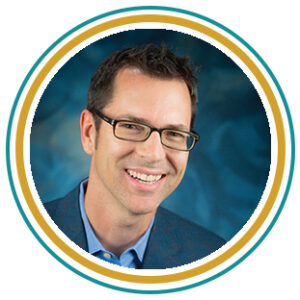Who do you know who carries substance as a leader? Not extraordinary talent or compelling charisma or impressive expertise, just substance. Weight of character. An unusual presence.
We might call it spiritual gravitas. Such men and women rarely seek the spotlight or dominate the room, but when they speak, you sense that their words rise from a deep core. Intuitively, you know that they carry a tensile strength forged in the heat of both victories and defeats. They have paid the price for the truths that now flow from their mouth, words that in turn evoke depths of trust and confidence. You feel drawn and secure, quietly inspired by something that’s hard to name.
Other leaders take up an impressive amount of space in a crowd. A commanding voice. Unshakeable confidence. Some type of magnetic personality. All eyes turn when they rise . . . and they rise often. Here you feel drawn as well, maybe even electrified by force of personality. But at the end of the day, you’re not sure how far you could trust them, not certain you would put your life on the line for them.
Years ago, I attended a small conference. The speaker had a modest following and a few books, but he was only really known within a fairly tight circle. Yet there was something I felt instantly. Gravitas. Spiritual authority. I was captivated, and I listened to him for hours without losing interest. Even more, I felt like something deep and true was being mysteriously established in me as he spoke.
The word gravitas might evoke images of somber faces and dreary tones, maybe even an intimidating aura, but none of that was true for this speaker. With an easy smile, he spoke softly in slow, thoughtful sentences with very little drama of presentation. It was not exactly a TED talk, yet I sat rapt with attention, content to let his words wash over me and seep inside.
I think that’s the thing about gravitas: It begets more gravitas. I have sometimes imagined myself becoming a dashing, charismatic speaker who could stir crowds and be much in demand. And while there’s nothing wrong with that, this guy made me want something different. I found myself wanting to speak from that same deep place, to carry a more grounded substance of being. This man will never know that he set my life course on a new trajectory.
Got Weight?
Gravitas comes from a Latin word that mirrors our English word “gravity,” anchored in the idea of weight. “Dignity,” “presence,” “influence”—these descriptors attempt to capture the effect that such a quality of character has on others.[i] In the social stampede for overt power, there is little demand for gravitas. But when you feel this subtle force in someone, you know instinctively that they are anchored to the earth, immune to the winds of fad and fashion. They don’t usually soar in popularity or plunge in ignominy. They are here today and here tomorrow, steadily elevating those around them with kindness and wisdom.

Over the past decade, I have coached many leaders, from starry-eyed entrepreneurs to buttoned-down corporate types, from savvy business owners to burned-out pastors, and all sorts in between. Each juggles talent and passion; each navigates setbacks and celebrates wins. Coaching is a great job, and I love watching people become the best version of themselves.
Here’s the thing: Almost no one hires me for character formation or spiritual growth. People hire me to achieve something that has dollars attached to it: starting a company, writing a book, training a work group, or coaching a key performer. All of these are good things, and I find joy in such meaningful work. But there is always a bigger story available behind that desire. Achieving an organizational goal or completing a project is the canvas on which the deeper work of formation is being crafted. And it is the soul more than the project that will endure.
Which brings us to the heart of the matter.
A Marketplace in Upheaval
Leadership development is a billion-dollar industry. New skills, new techniques, new lingo, new assessments, new gurus, and new books swing in and out of our attention every quarter like revolving ads on a website. There are a lot of smart people showing us how to do more, do it better, and do it faster than ever before. And in many ways, we have benefited from their strategic thinking and best practices. Time management, organizational theory, and marketplace scrutiny have made most of us better at what we do.
The axiom goes, “work smarter, not harder,” but for every leader I know who is absorbing all the “smarts” coming at us so furiously, I see a leader who is indeed working harder. The British philosopher Bertrand Russell speculated in 1932 that if we could merely improve our management expertise in society, the average person need only work four hours a day.[ii] About the same time, the economist John Maynard Keynes predicted that by the year 2030, a fifteen-hour workweek would be standard fare.[iii] Despite those rosy images, a recent Gallup poll placed the current average workweek at forty-seven hours,[iv] and most leaders I know would scoff at such a low number.

How does such a busy world allow for so lofty a concept as gravitas? Seriously, who has the time?
But lack of time for gravitas is killing us.
Leaders are burning out and flaming out at an epic rate. The opposite of gravitas surrounds us and blares from every media channel. Moral failures, abuses of power, and ruthless self-promotion are the more obvious symptoms of our anemic national character. In both ministry and the marketplace, we have succumbed to expediency at the cost of integrity. Where is the rootedness? Where is the humility?
We discuss the public falls with dismay and grieve the more private, personal falls. And mostly, we ignore the quieter alternative to burnout and flameout: numbing out. How many leaders have released their passion to disillusionment and slid softly onto autopilot?
We must draw the connection between symptoms and the root cause. The cause is a lack of roots. Truly, our culture channels a storm that is uprooting many.
Consider a client of mine. Vince is the president of a small telecom company that, at $25 million in gross profits, is modest within his industry. His company was put on the map by selling and installing pay phones. When is the last time you saw one of those? Material things, even the best and smartest, eventually decay. The only thing that kept Vince’s company from following their phones into extinction was a prudent shift into an entirely different part of the telecom market, where they are now thriving. They survived a potentially catastrophic market storm.
Storms serve a purpose: They expose dangerously weak foundations and invite new construction to our internal world. The greater the external pressure on our lives and leadership, the more God whispers to us in those rare still moments. Step off the gerbil wheel. You are made for more than turning the economic flywheel of industry. You are made for me! And only in me will you be useful in the workplace. Can you hear that whisper echo in the subterranean cavities of your soul? That divine invitation hangs in the air, directed to you personally.
Helping Write God’s Story
Whether leading in ministry or the marketplace, the men and women I know want to do more than turn a profit and grow an empire; they want to do good in the world. They want to write a redemptive, God-sized story in their sphere. They want their employees to thrive as individuals as well as contribute to the mission. They want the love of God to extend across the planet in ways that ease pain and establish peace. They want the earth to no longer groan under the weight of poverty and pollution and violence. And while they—and all of us—can’t do everything, we know in a profound way that we can indeed do something.

Another client owns a successful professional business: Janet Ward and fortyish employees bring in about $5 million a year. Commendable, but not necessarily remarkable. But here’s what is remarkable: They give away 10 percent of their revenue! That’s right, they tithe on the gross and put half a million dollars every year into about fifty nonprofits across the planet that are making life better for tens of thousands.[v] That is spiritual influence. That is something we don’t have enough of in today’s marketplace.
Spiritual substance. Depth. Weight. Spiritual gravitas. Where could we possibly turn to find a supply of such intangibles? What ancient cache could we open to obtain a spiritual rootedness that can withstand cultural storms and change the world for good in modern times?
A Wealth of Gravitas
What if there was a whole culture of spiritual substance, carefully cultivated over generations, with intentional practices and dedicated focus on the inner life? A leadership community that was all about going deep, not wide? Cloisters of men and women who anchored themselves in the life of God so that they could speak the words of God with quiet power?
Actually, this is part of our heritage. In Ireland, they were called Celts; in Russia, they were called poustinikki; in Egypt, they were called desert fathers and mothers. But the most common and inclusive word for these men and women of spiritual gravitas is monk.

The particulars of their lives, the qualifications of their communities, and the emphasis of their spiritual activity were as varied as their times and places dictated. And our own modern world calls for its own applications that relate directly to the needs of our time and place. The lifestyle of the monastery cultivated the very spiritual depth we feel such a dearth of today. We can no longer meet the complexity of today’s leadership challenges from the superficiality and shallowness of today’s leadership culture. We must reach back to a simpler time for deeper resources in order to become “monks in the marketplace.”
My Own Gravitas Failures
Let me get personal for a moment. When I speak of leading from a shallow, superficial space, I mean that I’ve not only seen it in others, I’ve known it intimately in my own journey. In my career, I’ve experienced two defining twelve-year cycles that mirrored one another as overarching life lessons that went something like this: exuberance → performance → disintegration → renewal. I guess I’m a tough case; once wasn’t enough!
Straight out of seminary, I launched into the pastorate with my new bride and, although zealous for God and my wife, I promptly displaced both with the mistress of ministry over that decade. It’s an all-too-common story, and I detail my recovery from it in my first book, Soul Space. It took a year’s sabbatical in the mountains of Colorado to restore my marriage and my soul, and the reorientation was profound. The crucible had done its refining work, but we were just getting started.
Several years later, a new vision emerged, and I launched my executive-coaching business in 2005. Again, I got off to an exciting, profitable start and experienced a steady upward trend for several years. But although my spiritual practices had deepened, they were not yet strong enough to support my growing influence. Over the next several years, my soul began to flounder.
As the recession hit, business took a dive, and I unconsciously correlated profitability with blessing. Like the girl picking pedals off a daisy, saying, “He loves me, he loves me not,” my felt experience of God’s affection rose and fell with the tides of my profit and loss statement. Through a long series of humiliations, God began to anchor my feet on the bedrock of his unceasing care for me, and I experienced an upswell of gravitas.
In an intensely personal way, I’ve come to learn that the core truths that comprise our life message are so precious to God and so fundamental to our calling that many rounds of refining and strengthening are necessary to empower the leadership God intends to bring forth from it. Like layers of an onion, we have to get through one shell to get to the next. In so doing, we pay the price over the course of time and testing in order to lead with spiritual authority.
This is probably a good time to clarify the sense in which I’m using the expression “spiritual authority.” I do not mean it to refer to positional authority, such as pastoral staff or the C-suite. Instead, I’m referring to what we’ve been talking about in these initial pages—the grace to influence others in redemptive directions by virtue of virtue, as a result of knowing God deeply and walking with God richly so our influence is inherently God-breathed. This quality often coincides with positional authority yet neither requires it nor can be replaced by it (Matthew 20:25).
For illustration, we need go no further than Jesus, a man with little cultural position yet who continually astounded his listeners, contrasting mightily with the positional authorities of his time:
“When Jesus had finished saying these things, the crowds were amazed at his teaching, because he taught as one who had authority, and not as their teachers of the law” (Matthew 7:28-29, emphasis added).
They seemed even more impressed by the authority he carried in word than in deed; the miracles were the evidence of the authority he carried in his person (Matthew 9:6). And authority was precisely what Jesus bestowed on his disciples as he sent them out to extend what he had begun (Matthew 10:1). Isn’t it time for us to live in the fullness of that calling once again?
How Far Is Your Reach?
So it’s worth asking, what is the sphere of your spiritual authority? How far is your influence meant to extend? Honestly, most of us don’t know—and that’s probably by design. If it were further than seems comfortable, we would likely be intimidated . . . and if it were smaller than our ambition, we might well chafe at the constraints. Most of us simply have to live into our destiny one day at a time.
But the reason it’s valuable to consider our reach lies in the classic illustration of the branches on a tree. Perhaps you know that the network of roots underneath a tree extend horizontally in roughly the same dimension as the branches.[vi] So, a tree with a twenty-five-foot height and a twenty-foot branch radius, like the weeping cherry in my backyard, would have a tangle of roots with approximately the same spread beneath the surface. And the towering willow oak just outside our fence probably has root tendrils that extend almost sixty feet in diameter! Talk about biological gravitas.

The influence of leaders can easily outgrow their character. It happens every day. God-engineered giftedness does what it was designed to do: It grows. Branches spread and influence rises. But what was meant for the glory of God is often undermined by a stunted root system, so we now have a leadership landscape virtually littered with capsized “trees,” men and women of great potential and calling whose spiritual formation in God was cut short in their rush to do great things for God. And maybe even somewhat for themselves.
So how far does your leadership influence extend? How many children rely on your spiritual foundation? How many employees or direct reports? How many in your small group? How many represented by the nonprofit board you’re on? How many read your books or blog, listen to your podcast, or are on your payroll? Frankly, we have little idea of just how much influence we already carry and are usually naively eager for more.
Now think about the roots underneath your tree. How strong are they, and how deep do they run? Can they sustain a class-7 gale with ease, or do they tremble in a summer thunderstorm? Before you grasp after that next promotion or instigate strategic planning for a new satellite office, it might be time to do some root work.
This book Gravitas is all about helping you extend your roots, deep and far. It’s not about helping you be more externally productive but about helping you thrive internally so that you can fulfill God’s greatest purpose through you.
At the same time, you’re busy. The pressure for productivity is a constant in your life. Is rootedness worth the time? In Jesus’ words, “Come, and you will see” (John 1:39).
If you’re ready to grow your gravitas, come join those who have gone before. Let’s learn from the monastics how to go more deep than wide. We don’t have to be the spiritual elite; all we need is desire . . . because that is precisely where God meets us and does extraordinary things. Let’s get started.
 You’ve been reading from the intro of Gravitas: The Monastic Rhythms of Healthy Leadership. Continue reading chapter one for free right here. Jerome Daley is an executive coach with specialties in culture-crafting, communication and conflict, self-leadership, and team development. Get his books, schedule a retreat or learn more about him at thrive9solutions.com.
You’ve been reading from the intro of Gravitas: The Monastic Rhythms of Healthy Leadership. Continue reading chapter one for free right here. Jerome Daley is an executive coach with specialties in culture-crafting, communication and conflict, self-leadership, and team development. Get his books, schedule a retreat or learn more about him at thrive9solutions.com.



so many are saying the same things today. Jesus said it best,…only good roots grow good fruits. When will we stop reading about it and just do it.